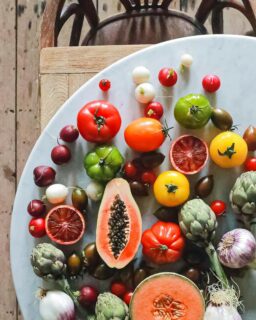I’m sure you’ve heard of the phrase, “eat your five a day”, which encourages the consumption of either five fruits and vegetables or five servings of fruits and vegetables a day. Unfortunately, for many, this is easier said than done, which is why some would rather focus on eating 25-30 plant foods a week rather than just five a day.
Taking to her Instagram page, Michelle Gillette, a certified functional medicine health and longevity coach, spoke about the benefits of eating 25 plant foods a week and how this could be the key to a healthier you.
The Longevity Power of 25 Plant Foods
In 2018, the British & American Gut Project looked at the diets of over 10,000 people and assessed how these different diets may influence health outcomes. Per the findings, published in ASM Journals, those who ate a diet high in a variety of plant foods – an optimum of 30 different ones – were found to have the healthiest microbiomes. This, in turn, meant that they were more likely to experience better health outcomes.
What are the health benefits of 30 a week?
1. A healthier gut microbiome
Writing on her Instagram, Gillette echoed the findings of a previous study, stating that eating at least 25 different plant foods weekly can supercharge your gut microbiome, leading to better health, wellness, and longevity. Per Gillette, each type of plant food feeds different beneficial bacteria in your gut, creating a rich, balanced environment, which can be great for your longevity.
In fact, a 2023 study published in Nature found that centenarians (people who live to 100 and beyond) have a more diverse gut microbiome than younger people.
2. A healthier immune system
Plant foods are rich in vitamins, minerals, and antioxidants, which can help to create a stronger immune system.

Photo by Geraud pfeiffer/Pexels
3. Improved mental health
A study published in the International Journal of Environmental Research and Public Health found a strong association between high-quality, omnivore, vegan, and vegetarian diets and lower depressive symptoms.
As mentioned, plant foods are rich in many antioxidants, and some of these compounds can affect various brain chemicals, impacting our mood and mental well-being.
Eating 25-30 plant foods a week
Admittedly, this sounds like a lot to do, but you’ll be happy to hear that it’s not just fruits and veggies that count. Gillette points out that spices and herbs, as well as nuts and seeds, count as plants, and creating a trail mix can check off about 8- 10 plants.
Here’s a list of different plant foods that you can add to your diet on a weekly basis
- Vegetables:
- Asparagus
- Bell Peppers
- Broccoli
- Cabbage
- Carrots
- Eggplant
- Red onion
- Spinach
- Sweet potatoes
- Zucchini
- Fruits:
- Apples
- Avocados
- Bananas
- Blueberries
- Figs
- Kiwis
- Oranges
- Raspberries
- Tomatoes
- Legumes:
- Black beans
- Chickpeas
- Edamame
- Green beans
- kidney beans
- Lentils
- Pinto beans
- Whole Grains:
- Brown rice
- Bulgar wheat
- Oats
- Quinoa
- Nuts:
- Almonds
- Brazil nuts
- Cashews
- Pistachios
- Walnuts
- Seeds:
- Chia seeds
- Flaxseeds
- Hemp seeds
- Pumpkin seeds
- Sesame seeds
- Sunflower seeds
- Herbs:
- Basil
- Cilantro
- Mint
- Oregano
- Parsley
- Rosemary
- Sage
- Spices:
- Black pepper
- Cumin
- Ginger
- Nutmeg
- Paprika
- Saffron
- Turmeric
Increasing the Power of 25 in Your Life
If you’re concerned about getting your 25-30 a week, here are some tips that can help:
- Keep your pantry and fridge stocked with a variety of fruit, vegetables and canned plant foods
- Add nuts and seeds to your salads, or yogurts
- Swap out your usual snacks like chips or candy for trail mix, fruit or sliced vegetables with hummus.
The Power of 25 Recipes
With that said, here’s a week’s worth of recipes that will provide a plant-powered dose of longevity;
- Monday: Carrot and Chickpea Salad With Harissa Paste
- Tuesday: Crispy Sesame Seed Fish
- Wednesday: Aromatic Citrus Chicken
- Thursday: Ancient Grain Salad
- Friday: Sweet Potato and Bean Mash
- Saturday: Quinoa Salad With Roasted Veg & Spinach
- Sunday: Chipotle Black Bean & Quinoa Soup
References
@michellegillette_ (2024). Instagram. Available at: https://www.instagram.com/michellegillette_(Accessed: 17 September 2024).
Johansen, J., Atarashi, K., Arai, Y., Hirose, N., et al. (2023). Centenarians have a diverse gut virome with the potential to modulate metabolism and promote healthy lifespan. Nature Microbiology, 8(6), 1064-1078. https://doi.org/10.1038/s41564-023-01370-6
McDonald, D., Hyde, E., Debelius, J.W., Morton, J.T., et al. (2018). American Gut: an Open Platform for Citizen Science Microbiome Research. mSystems, [online] 3(3). doi:https://doi.org/10.1128/msystems.00031-18.
Walsh, H., Lee, M., & Best, T. (2023). The Association between Vegan, Vegetarian, and Omnivore Diet Quality and Depressive Symptoms in Adults: A Cross-Sectional Study. International Journal of Environmental Research and Public Health, 20(4). https://doi.org/10.3390/ijerph20043258



![women [longevity live]](https://longevitylive.com/wp-content/uploads/2020/01/photo-of-women-walking-down-the-street-1116984-100x100.jpg)










